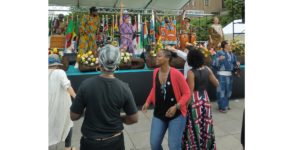The worst African refugees in the world
IDJ ENGLISH
『International Development Journal』 2019 September edition
Largest East African refugees
In August, 2019, the 7th Tokyo International Conference of African Development (TICAD7) was held in Yokohama. The conference discussed how Africa could develop, but then there is a sad reality that Africa cannot avoid. That is the endless waves of refugees. This wave has turned into a tsunami and has caused many tragedies.
African refugees make up more than 30% of the world’s refugees. According to the United Nations High Commissioner for Refugees (UNHCR), the size of sub-Saharan refugees in 2019 was 24.2 million. It is the largest in the world, compared with 16.8 million in the Middle East.
By region, East Africa has the largest illegal population of 12 million including Somali and Sudan, where conflicts have continued and riots have been frequent. Central Africa is followed by 0.7million, West Africa by 3.6million and Southern Africa by 0.5million. Incidentally, North Africa has only 0.8million people.
Globally, 70.8 million people have been displaced by conflict or persecution. According to UNHCR, this situation has doubled compared to 20 years ago and is comparable to the population of Thailand and Turkey.
Now, the problem is where refugees of a destructive scale arrive. While Chad and Ethiopia accept many refugees, African youth who see Europe as a utopia are crossing the Mediterranean via Libya and Morocco resulting in tragedy. Recently, with the spread of smartphones, you can learn about the rich and peaceful scene of Europe in any countryside in Africa.
The influx of refugees is a headache for Europe, which suffered from the unusual situation of more than 1 million refugees in 2015. Germany, which is willing to accept it, has recently begun to be repulsed by citizens and is gradually becoming reluctant. The need for labor recruitment has also declined, and citizens are beginning to see a resurgence that could ruin traditional European societies. Their dissatisfaction seems to be accompanied by the anxiety that refugees will be entitled to the social security that is available to citizens.
However, Europe has a historical burden on Africa with colonial rule from the 15th and 16th centuries. To this end, the European Union (EU) provided € 4,566,700 in 2018 to create jobs for youth in Africa in 2018 to address the issue of refugees in Africa as a European problem We came up with a plan.
African colonization
In any case, relations between Europe (mainly Portugal, Spain, UK, France, Netherlands, Germany, Italy, etc.) and Africa have a close history. According to Gui Richard, a professor emeritus at The University of Caen Normandy, “The 10,000 Year History of Immigration” (2002), the relationship between the two began as early as the 15th century when Europeans embarked on a sea capture. Portuguese sailors arrived on the Congo River in 1482, and in 1487 discovered a sea route from the Cape of Good Hope to the Indian Ocean. Meanwhile, in 1484, the Portuguese were in contact with King Congo of Central Africa. In the 17th century, Angola on the Atlantic Ocean and Mozambique on the Indian Ocean were the first European colonies in Africa.
By the end of the 15th century, however, European interest was being shifted from Africa to the New Continent (the Americas), and a tragic slave trade from Africa began. The number is terrible, ranging from 9 million to 20 million. He says that the African slave trade was a sharp brake on the development of the African continent. Africa’s vitality was deprived as slave merchants looted from the coast and into deeper Africa.
In the first half of the 19th century, Africa became a production base for various industrial raw materials that supported the industrial revolution that began in the United Kingdom. They began full-scale colonial management. And emigration from Europe also commenced. In South Africa, however, migration from Europe had already begun as early as the 17th century.
In the mid-17th century, 600 Dutch and Germans settled in Cape Town. Eventually, a segregation policy (apartheid) was born. This seems to have been a symbol of the start of the African fight against white domination.
The question of African nation-building
Now, a decisive historical event in the sense of “domination” took place in Africa-Europe relations. It was the Berlin Conference of 1885. The European colonial powers have decided to divide and rule Africa like its own territory. This resulted in the division of African ethnic groups.
A Report presented by Kofi Annan, the then Secretary-General of the United Nations, in 1998 on the causes of conflict and the promotion of durable peace and sustainable development in Africa,stated that“Imperial powers divided Africa into territorial units, which forced Africa to build nations and nation-states at the same time, which also fueled a strong centralization of political and economic power.” He said,“The challenge remains to forge a genuine national identity among competing heterogeneous community ethnic groups”. A major challenge is that“competitive communities (each ethnic group) have their own security, perhaps their own. You may have come to think that even the survival itself can only be secured through the seizure of state power, in which case conflict will be inevitable”.
However, most Africans do not have a very strong “sense of border”. They are appearently seeking a suitable place to survive while traveling freely through the ancestral land. The challenge to reach Europe is the Mediterranean. But for them the ocean and terrestrial risks are the same and even if they are deceived by Moroccan and Algerian villains, they dream of “El Dorado” and try to move to Europe. They do not mind the norms of modern nations.
One scholar says that European crimes in Africa could be offset in the sense of “contribution to civilization” in Europe. But how do you refute when it is said that European civilization itself is at the expense of Africa?
By Mitsuya Araki, Editor-in-chief of IDJ
***** 以下、日本語原文 *****
羅針盤 世界最悪のアフリカ難民 問われる欧州の歴史的責任
最大の東アフリカ難民
2019年8月、第7回アフリカ開発会議(TICAD7)が横浜で開催された。会議ではどうしたらアフリカは発展するかが議論されたが、その上で避けて通れない悲しい現実がアフリカにはある。際限なく続く難民の波だ。この波は今、津波となって多くの悲劇を産んでいる。アフリカ難民の規模は、世界の難民の30%以上を占めている。国連難民高等弁務官事務所(UNHCR)によると、2019年のサハラ以南の難民の規模は2,421万3,204人。中近東の1,678万3,819人よりも多く、世界最大となっている。
地域別に見ると、無法地帯となっているソマリアや紛争が続き暴動も多発しているスーダンなどを抱えた東アフリカが、1,240万8,485人で最も多い。続いて中部アフリカが76万6,805人、西アフリカが359万887人、南部アフリカが52万702人である。ちなみに北アフリカは85万1,417人にとどまっている。
世界全体で見ると、紛争や迫害によって故郷を追われた人々の規模は7,080万人に達する。UNHCRによると、この状態は20年前に比べて倍増しており、タイやトルコの人口規模に匹敵すると言う。
さて、問題は、破壊的な規模に達した難民の流入先である。チャドやエチオピアは多くの難民を受け入れているが、欧州をユートピアのように思っているアフリカ青年たちは、悲劇を繰り返しながらもリビアやモロッコを経由して地中海を渡っている。最近はスマートフォンなどの普及で、アフリカのどんな田舎でも豊かで平和な欧州の情景を知ることができる。
2015年に100万人超の難民が流入するという異常事態に悩まされた欧州にとって、難民流入は頭痛の種である。受け入れに前向きなドイツも最近では市民の反発を受け始め、少しずつ消極的になり始めている。労働者の補充というニーズも減少し、欧州の伝統社会を根底から壊しかねないという反発を市民から受け始めているようだ。彼らの不満には、市民の受けられる本来の社会保障まで難民にくわれてしまうのではないかという不安も加わっているようだ。
しかし、欧州はアフリカに対し、15~16世紀からの植民地支配という歴史的な負荷を背負っている。このため、欧州連合(EU)は欧州全体の問題としてアフリカの難民問題に対処すべく、2018年、アフリカにおける若者の雇用創出を産み出す計画に総額45憶6,700ユーロ(約580憶円)の支援策を打ち出した。
アフリカ植民地化
いずれにしろ、欧州(主にポルトガル、スペイン、英国、フランス、オランダ、ドイツ、イタリアなど)とアフリカとの関係は、因縁深い歴史を有している。カーン大学名誉教授であるギ・リシャール監修の『移民の一万年史」(新評論、2002年)によると、双方の関係は15世紀初めに欧州人が海の攻略に乗り出した頃から始まっている。ポルトガルの船乗りたちは1482年にコンゴ川にたどり着き、1487年、喜望峰からインド洋への海路を発見する。その間の1484年、ポルトガル人は中央アフリカのコンゴ王と接触している。さらに17世紀には、大西洋に面したアンゴラとインド洋に面したモザンビークが、アフリカで最初に欧州の植民地となった。
ところが15世紀末になると、欧州の関心はアフリカから新大陸(アメリカ大陸)へ向けられ、アフリカからの悲劇的な奴隷貿易が始まる。その数は900万人から2,000万人という恐るべき数字があげられている。アフリカ人の奴隷売買はアフリカ大陸の発展に急ブレーキをかけるものであったと言う。奴隷商人たちが略奪しながら沿岸からアフリカ奥地に入り込むにつれて、アフリカの活力は奪われていった。
19世紀前半には、アフリカは英国から始まった産業革命を支える色々な産業原材料の生産基地になっていく。本格的な植民地経営へ踏み出したのだ。そして、欧州からの移住も始まった。ただ南アフリカでは、17世紀という早い時代からすでに欧州からの移住は始まっていた。
17世紀半ばには、オランダ人とドイツ人の600人がケープタウン地方に定住する。そのうち人種隔離政策(アパルトヘイト)が生まれる。これがアフリカ人の白人支配への戦いを開始するシンボルになったと思われる。
問われるアフリカの国造り
さて、アフリカと欧州との関係で「支配」という意味で決定的な歴史的出来事が起きた。それは、1885年のベルリン会議であった。欧州植民地列強はアフリカを自分たちの領土のように分割統治することを決めた。これによりアフリカの民族が分断されることになった。
1998年4月に当時国連事務総長を務めていたコフィー・アナン氏が提出した「国連事務総長報告:アフリカにおける紛争の諸原因と永続的平和および持続的発展の推進」では、「植民地列強はアフリカを領土的単位に分割した。この分割で国家建設と国民形成を同時に行うことを強いられた。それが、また政治的、経済的権力の強力な中央集権化に拍車をかけた」と述べている。そして、「競合する異質のコミュニティー民族の間から真正の国家的アイデンティティーを鍛造する課題も残された」とし、大きな課題として「競合する諸コミュニティー(各民族)は、自らの安全、おそらく自らの生き残りそのものさえも、国家権力の掌握を通じてしか確保できないと考えるようになったかもしれない。そのような場合、紛争は不可避となる」と将来を危惧している。
しかし、一般の多くのアフリカ人は“国境意識”をそれほど強く持っているわけではない。先祖伝来の大地を自由に移動しながら、生存適地を求めているように見える。欧州への難関は地中海であるが、彼らにとって海のリスクも地上のリスクも同じで、時にモロッコ、アルジェリアの悪徳業者にだまされようとも“エルドラド(黄金郷)”を夢見て欧州へ移動しようとする。彼らには、近代国家の規範など通用しない。ある識者は、アフリカへの欧州の罪は、欧州の“文明への貢献”という意味で相殺できるのではないかと言う。しかし、欧州文明そのものがアフリカの犠牲の上に成り立っていると言われると、どう反論するだろうか。
『国際開発ジャーナル』主幹 荒木光弥
『国際開発ジャーナル』2019年9月号掲載記事




